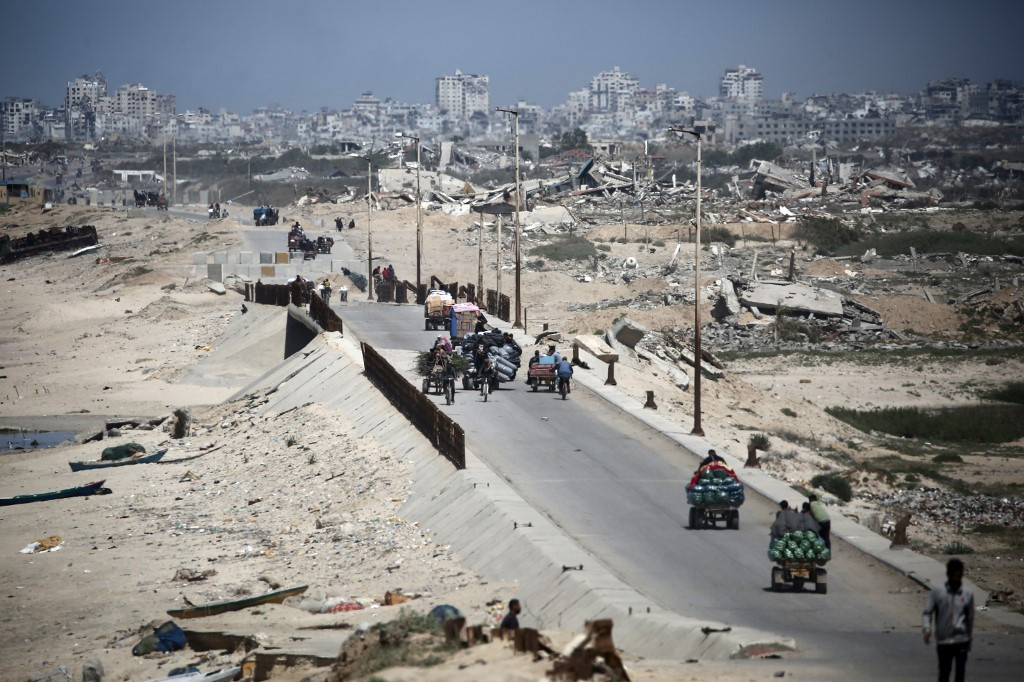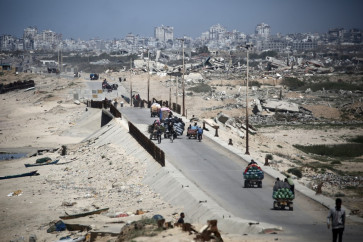Popular Reads
Top Results
Can't find what you're looking for?
View all search resultsPopular Reads
Top Results
Can't find what you're looking for?
View all search resultsSaving Gazans but forgetting about Palestine
Sympathy without structure can devolve into sentiment without solutions, especially if the receiving country lacks the systems needed to truly welcome, care for and protect the displaced.
Change text size
Gift Premium Articles
to Anyone
 Palestinians transport goods along the coastal Al-Rashid Road, linking Gaza City in the north and Nusseirat in the central part of the Palestinian territory on April 4, 2025. Israel announced the launch of a new ground offensive in Gaza City on April 4, with rescuers saying military operations had killed at least 30 people across the Palestinian territory since dawn. (AFP/Eyad Baba)
Palestinians transport goods along the coastal Al-Rashid Road, linking Gaza City in the north and Nusseirat in the central part of the Palestinian territory on April 4, 2025. Israel announced the launch of a new ground offensive in Gaza City on April 4, with rescuers saying military operations had killed at least 30 people across the Palestinian territory since dawn. (AFP/Eyad Baba)
A
s Indonesia prepares to evacuate 1,000 war victims from Gaza to its own soil, many have hailed the move as an act of noble humanity. But global history reminds that not all assistance equates to liberation.
In many cases, displacement occurs not through force but through empathy, wrapped in good intentions. Before the planes carrying Gaza people take off, we must ask a deeper question: Is this a rescue or removal mission?
Last year, as the president-elect, Prabowo Subianto stated that this evacuation was intended to protect women and children from the terror of war. Now the President is touring the Middle East to seek support for his plan.
As a nation that upholds freedom and solidarity, it is hard not to feel sympathy, especially for people in Gaza who have been suffering from Israel’s attacks since October 2023. But sympathy without structure can devolve into sentiment without solutions, especially if the receiving country lacks the systems needed to truly welcome, care for and protect the displaced.
As a physician, I am used to treating wounds. But the wounds of war are never just blood and broken bones. These wounds show up as existential disorientation, uprooted lives and trauma that shatters childhoods.
According to the World Health Organization more than 70 percent of children in Gaza exhibit symptoms of post-traumatic stress disorder (PTSD). These are not just physical casualties; they are a generation shaped by war.
Countries like Canada and Germany have implemented Trauma Informed Care Frameworks, multidisciplinary approaches involving medical professionals, psychologists, social workers and cultural translators. In Indonesia, this approach has yet to become a national standard. The question is simple: If we receive them, are we truly ready, or are we merely hoping time will heal them?


















